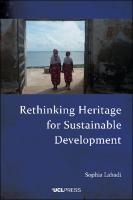Rethinking Heritage for Sustainable Development
Abstract
The Sustainable Development Goals (SDGs) adopted by the UN in 2015 have influenced the actions of international and intergovernmental organisations and governments around the world, and have dictated priorities for international aid spending. Culture, including heritage, is often presented as fundamental to addressing the SDGs: since 2010, the United Nations has adopted no fewer than five major policy recommendations that assert its importance as a driver and enabler of development. Yet, heritage is marginalized from the Sustainable Development Goals. Rethinking Heritage for Sustainable Development constitutes a substantial and original assessment of whether and how heritage has contributed to three key dimensions of sustainable development (namely poverty reduction, gender equality and environmental sustainability) within the context of its marginalisation from the Sustainable Development Goals and from previous international development agendas. Sophia Labadi adopts a novel, inclusive, large-scale and systematic approach, providing the first comprehensive history of the international approaches on culture (including heritage) for development, from 1970 to the present day. This book is also the first to assess the negative and positive impacts of all the international projects implemented in sub-Saharan Africa by a consortium of UN organisations that aimed to provide evidence for the contribution of heritage for development in time for the negotiation of the SDGs. The book’s conclusions provide recommendations for rethinking heritage for development, while reflecting on the major shortcomings of the selected projects.
Keywords
heritage; sustainable development; sustainability; Africa; international aid; poverty reduction; Sustainable Development Goals; Development; World Heritage; Culture; Intangible Heritage; Mozambique; Senegal; Ethiopia; Namibia; Climate Change; Illicit Trade; neoliberalism; UNESCO; World Bank; UNDP, Gender Equality; Environmental Sustainability; local communities; Heritage Studies; Archaeology; Anthropology; Development Studies; Gender Studies; Tourism Studies; Environmental Conservation; African Studies; International Relations; Social Geography; Economic Geography; Cultural Geography; Cultural Studies; Humanitarian Studies; Community Development; Politics; Governance; Identity Politics; Identity; SDGDOI
10.14324/111.9781800081925ISBN
9781800081925, 9781800081932, 9781800081949, 9781800081956, 9781800081963, 9781787358287, 9781911307099, 9781800081925Publisher
UCL PressPublisher website
https://www.uclpress.co.uk/Publication date and place
London, 2022Imprint
UCL PressClassification
Museology and heritage studies
Development studies
Archaeology
Sustainability


 Download
Download